
CHAPTER XI: Preserving the Teeth
Health to a large extent depends upon the health of the teeth. In fact, recent research has linked poor teeth and gums to such terrible problems as heart disease.
Food can not be properly masticated without sound molars. The modern tendency of teeth to decay early in life clearly proves that something is wrong with our diet or our chewing habits. Like any other part of the body, the teeth must be exercised in order to be properly preserved. Our foods are so frequently macerated to a fine consistency and they are so often cooked to a mush before they are eaten, that the teeth have little to do. They decay and become soft or brittle because of lack of use.
Teeth Whitening Products
It is necessary to give the teeth a reasonable amount of regular use.
Cultivate the habit of eating zwieback, hard crackers or other hard food substances that require real vigorous chewing. If this is difficult, then make a habit of exercising the teeth in some way. The idea suggested in the illustrations accompanying this chapter will be found of value, though any method can be recommended that serves the same purpose. Do not, however, depend upon the chewing of gum for hours each day as a means of exercising the teeth. Chewing a hard gum for a few minutes after a meal might be of advantage, but continual gum- chewing wastes and weakens the digestive elements of the saliva. In other words, if you sit down to a meal after chewing gum for two or three hours, the saliva that you mix with your food will not have the normal digestive elements. One might say that the "strength" of the saliva has been lost while chewing gum.
If your teeth are decayed the offending members should be removed or the cavities filled. It is always wise to retain every tooth you can until extraction is practically compulsory. Decayed teeth should be filled promptly. As long as a tooth can be filled it should not be extracted. A good dentist should be consulted at frequent intervals.
Removing Tartar From Teeth
If tartar has collected on the teeth, it should be removed by a competent dentist. One good method of keeping the teeth free from tartar is to rub the gums and teeth daily with table salt containing considerable grit. Dampen the finger, place a quantity of table salt thereon and then rub the teeth where they meet the gums. Make the process sufficiently vigorous to rub off any tartar that may have accumulated. The mouth should be rinsed with moderately warm water immediately after this process to remove the salt. Any good tooth wash that is sold in the form of paste can be used instead of salt for this same purpose. This rubbing process is of more value to strengthen the gums and to cleanse the teeth than brushing the teeth with an ordinary tooth brush.
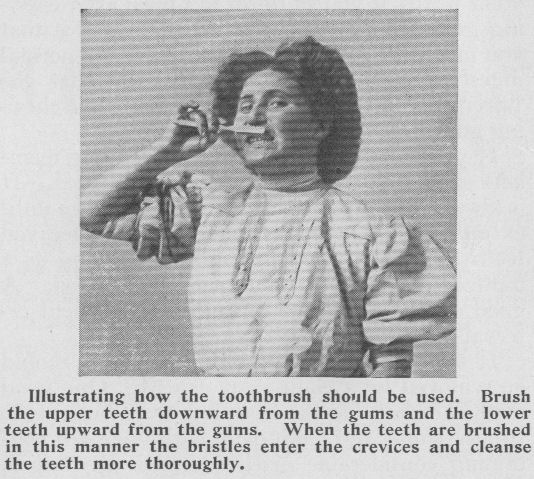
Tooth brushes, however, are valuable and should be used morning and evening. In caring for the teeth the following plan is suggested:
Soon after rising rinse the mouth out thoroughly with a mild antiseptic tooth wash; soap, or salt and water, is fairly good if nothing better can be obtained. Plain water will also serve the purpose. Lemon juice to which considerable water has been added, also makes a good mouth wash. Orange juice can also be recommended.
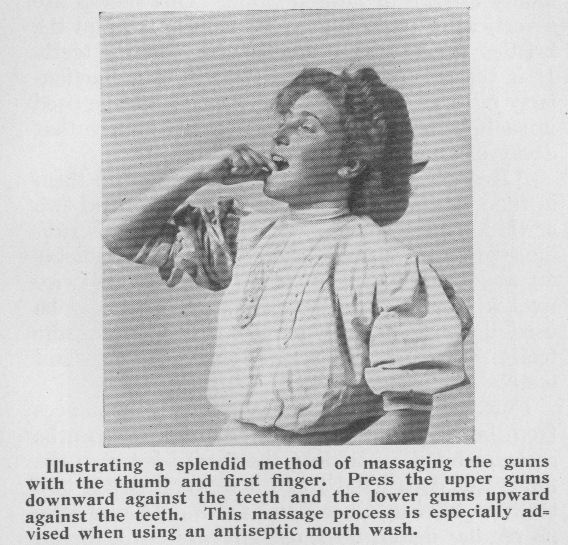
It may be said that most of the standard tooth powders and tooth pastes on the market at the present time are fairly reliable and satisfactory, particularly those of which the formula is printed on the wrapper. When brushing the teeth, avoid using a brush with the bristles too hard. A medium- or even a soft-bristle brush is preferable. The lateral action of the tooth brush, commonly used, is of limited value. One should use a vertical or up-and-down movement, so that the bristles will reach the crevices between the teeth. It is the spaces between the teeth that particularly need cleaning and the brush should be used in such a way as to reach these. It is here that decay usually begins.
After having brushed the teeth then rub them in the manner previously described. Spend two or three or even four or five minutes at this rubbing process. If the teeth are free from tartar do not use the salt more than once or twice weekly, though any good tooth paste could be used daily to advantage, not for brushing the teeth, mind you, but for rubbing the gums and teeth.
For removing accumulated food substances from between the teeth silk or linen floss can be recommended. Holding the thread between the fingers of each hand force it down between two teeth and bring it back and forth. If you have no regular dental floss, use any white silk thread for the purpose. It does not do one much good to brush the teeth if he does not remove decaying and acid-forming matter from between the teeth. The use of dental floss is fully as important as the use of a tooth brush. Where Rigg's disease, or pyorrhea, is present, an antiseptic can be used to advantage two or three times daily after rubbing or washing the teeth. Massage of the gums may prove helpful, if gently applied, though in a serious case of pyorrhea a fasting and general blood-purifying regimen is advisable.
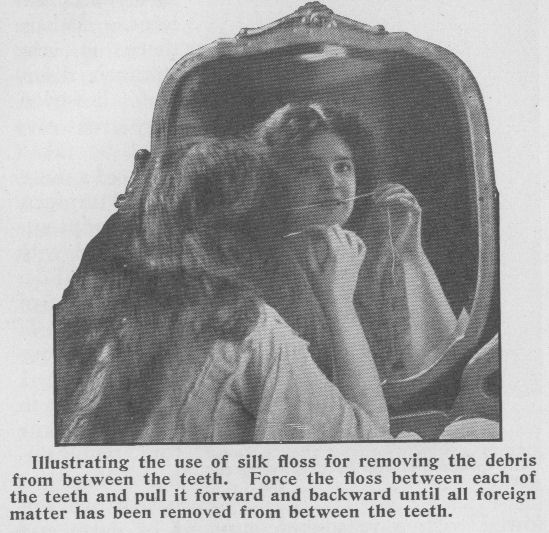
The condition of the teeth is influenced to a large extent by the state of the stomach. Where the digestion is perfect, the breath free from all foul odors, the teeth are less liable to decay and tartar rarely accumulates. Where there is any stomach disorder, however, very great
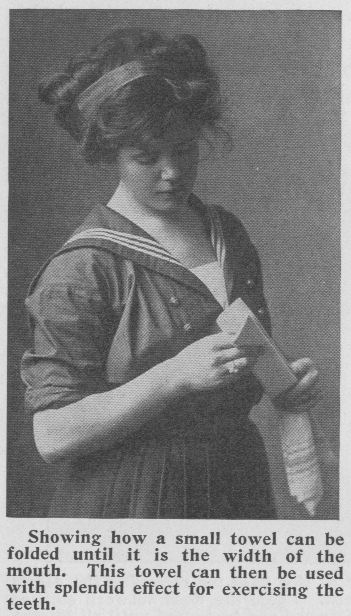
care must be taken to avoid a number of unpleasant symptoms associated with the gradual deterioration of the teeth. If the various suggestions I have made in this volume for maintaining superior health are followed with a reasonable amount of care, and the tooth brush is used regularly, in addition to proper attention being given to thorough mastication, the teeth should be retained as long as there is use for them. Remember, however, the very important suggestion made in another chapter in reference to the value of fruit acid in cleansing the mouth and teeth. If you will rinse the mouth out at frequent intervals with the juice of an orange or eat part or all of an orange, you will be surprised at the cleansing influence of this acid fruit. Almost any acid fruit will be of value, but the orange is perhaps the best for this purpose. The free use of water to insure alimentary cleanliness together with the acid fruit habit will form a very superior insurance for our teeth.
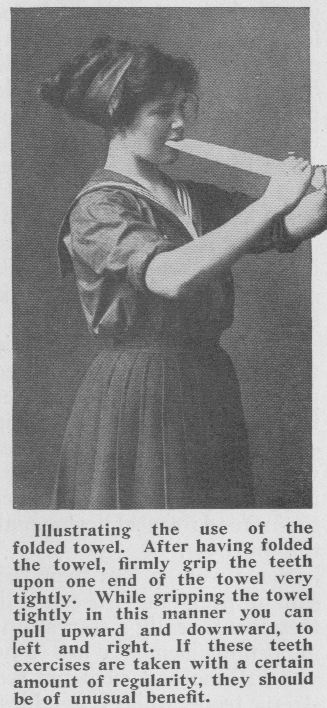
Finally, and of not least importance, the character of the diet has a great influence on the teeth. You cannot keep the teeth sound and strong if the foods you eat do not contain the material out of which teeth are built. If the food elements that build teeth and bone are lacking, you cannot expect the teeth to last long. A great hue and cry has been raised about the poor teeth of the school children of to-day, and an effort is being made to teach the children to brush their teeth. Of course this is good as far as it goes, but it does not go far when the children are fed upon a diet that is defective. When you find the child of a poor family given a diet of little more than white bread and coffee you can absolutely depend upon it that his teeth are crumbling and decaying. No other result is possible, no matter if the greatest of care is used to keep the teeth well brushed and clean.
Therefore, my remarks in another chapter upon the influence of refined foods will apply particularly in the case of the teeth. A satisfactory supply of lime in the diet is especially necessary for building teeth and bone. Whole-wheat bread will supply the material for building sound teeth, while oatmeal and other whole grain foods are almost equally satisfactory for this purpose.
Some women lose their teeth rapidly as a result of pregnancy, because the diet upon which they live is really a starvation diet so far as these important elements are concerned. Eggs are rich in lime and elements required for building strong teeth, while vegetables and fruits in their natural state are valuable in this way. Good milk is of value for its supply of lime and other organic minerals in the case of young children. Furthermore, all natural foods that provide good exercise for the teeth through the necessity for mastication are valuable on this account for strengthening the teeth, as I have already said.
Dentistry is one of our most useful professions. But there would be need for few dentists if the suggestions given in this chapter were closely followed by men, women and children the whole country over. One may have strong teeth in practically every instance, as a result of proper care and suitable diet, just as he may have strong muscles, strong organs and strong nerves.
Vitality Supreme - Table of Contents
Health Benefits of Teeth Whitening
RELATED ARTICLE: THE 8 BEST PRACTICES FOR HEALTHY TEETH AND GUMS
Web Page Copyright 2024 by Donovan Baldwin

